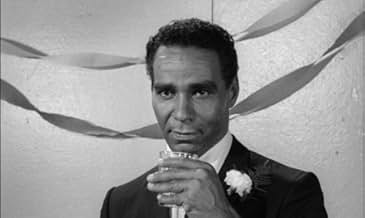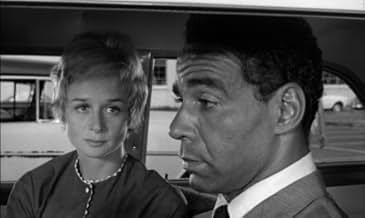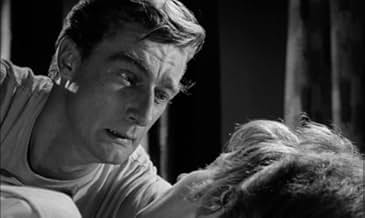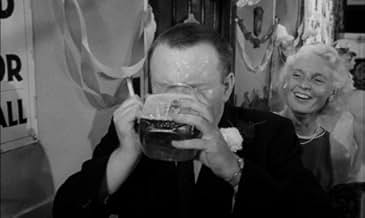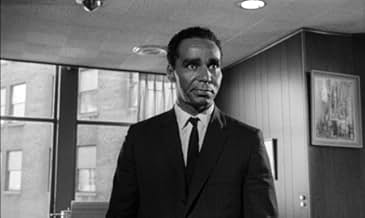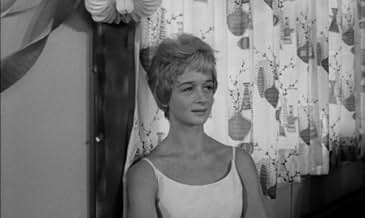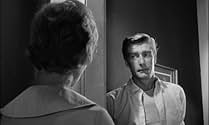ÉVALUATION IMDb
7,2/10
973
MA NOTE
Étude du mariage interracial dans les années 1960 montrant les préjugés de l'époque.Étude du mariage interracial dans les années 1960 montrant les préjugés de l'époque.Étude du mariage interracial dans les années 1960 montrant les préjugés de l'époque.
- Nommé pour 1 oscar
- 2 victoires et 4 nominations au total
Martha L. Mericka
- Ellen Mary
- (as Marti Mericka)
Vinnette Carroll
- Martha Richards
- (as Vinette Carroll)
Anthony Spinelli
- Johnny Hruska
- (as Sam Weston)
Kenny Bass
- Orchestra Leader
- (uncredited)
Joel Ehrlich
- Bart
- (uncredited)
Dick Flaisman
- Saxophone Player
- (uncredited)
Doris Helsel
- Minister's Wife
- (uncredited)
Paul S. Orgill
- Lawyer
- (uncredited)
Bea Pestotnik
- Wedding Guest
- (uncredited)
John Pestotnik
- Wedding Guest
- (uncredited)
Commentaire en vedette
This film is simply shot and compellingly told. Its stars Barbara Barrie before she became a star and features an excellent cast including a performance by a child that is so touching. I saw it as a kid with my mother and was very moved by it. I count it as one of my favorite films. I haven't seen it in years and am curious to see if I would still find it as moving. As another reviewer on this site stated, the ending is gut wrenching and I concur. I would love to buy it and show it to a film class I teach but sadly it is not available. It is one of those black and white American Kammerspiel films of the 1960s (along with A Thousand Clowns, Ladybug, Ladybug, David and Lisa) that were well received at the time of their release but are now forgotten). I don't know how one goes about getting distributors to transfer these films to DVD and make them available but if anyone knows please push for this film.
- nyc-born
- 17 janv. 2007
- Lien permanent
Histoire
Le saviez-vous
- AnecdotesIntermarriage between African-Americans and Caucasians was illegal in 16 states until the US Supreme Court decision Loving v. Virginia was handed down on June 12, 1967. The court unanimously ruled that anti-miscegenation marriage laws were unconstitutional. In his opinion, Chief Justice Earl Warren wrote, "The freedom to marry has long been recognized as one of the vital personal rights essential to the orderly pursuit of happiness by free men. Marriage is one of the 'basic civil rights of man, fundamental to our very existence and survival. To deny this fundamental freedom on so unsupportable a basis as the racial classifications embodied in these statutes, classifications so directly subversive of the principle of equality at the heart of the Fourteenth Amendment, is surely to deprive all the State's citizens of liberty without due process of law. The Fourteenth Amendment requires that the freedom of choice to marry not be restricted by invidious racial discriminations. Under our Constitution, the freedom to marry, or not marry, a person of another race resides with the individual and cannot be infringed by the State." Interestingly, many anti-miscegenation marriage laws were enacted in the wake of African-American heavyweight champion Jack Johnson's marriages to two Caucasian women, as pointed out in Ken Burns' documentary Unforgivable Blackness: The Rise and Fall of Jack Johnson (2004). Johnson married his white mistress Etta Duryea in late 1910 or early 1911, then married another white woman, Lucille Cameron, soon after his first wife's September 1911 suicide. The two marriages outraged white America, and Johnson and Cameron fled America for Canada and then Europe under threat of lynching. Their relationship was fictionalized in the stage play, and subsequent movie, L'insurgé (1970), for which the Caucasian playwright Howard Sackler won the Pulitzer Prize. The 1913 Massachusetts anti-miscegenation marriage law, which did not recognize any marriage made in a state forbidding the marriage of different classifications of people (the law left unspoken the racial issue of black and white; in Virginia, blacks were allowed to marry other, non-white "races"), was considered inoperative after Loving v. Virginia until in 2005, then-governor Mitt Romney used it as the basis to deny out-of-state couples the right to wed in the Commonwealth of Massachusetts after the Bay State's Supreme Court legalized gay marriage.
- ConnexionsFeatured in C'est assez noir pour vous?!? (2022)
Meilleurs choix
Connectez-vous pour évaluer et surveiller les recommandations personnalisées
- How long is One Potato, Two Potato?Propulsé par Alexa
Détails
- Date de sortie
- Pays d’origine
- Langue
- Aussi connu sous le nom de
- One Potato, Two Potato
- Lieux de tournage
- Painesville, Ohio, États-Unis(".............where this picture was shot in its entirety, our thanks.")
- société de production
- Consultez plus de crédits d'entreprise sur IMDbPro
Box-office
- Budget
- 340 000 $ US (estimation)
- Durée1 heure 23 minutes
- Couleur
- Mixage
- Rapport de forme
- 1.37 : 1
Contribuer à cette page
Suggérer une modification ou ajouter du contenu manquant

Lacune principale
What is the English language plot outline for Le procès de Julie Richards (1964)?
Répondre








